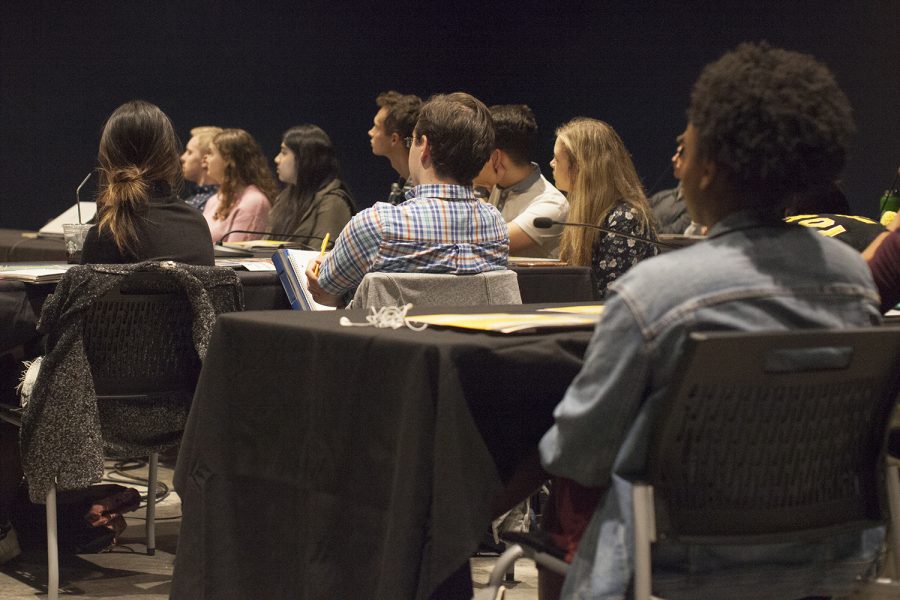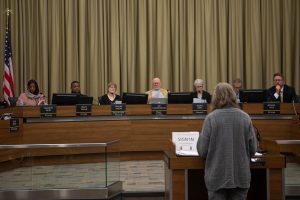Election Code adaptations hope to rid UI Student Government of former transparency issues
University of Iowa Student Government passed several updates to the election code Tuesday night in an effort to increase opportunity to join the organization during spring elections.
Senators listen to a presentation during a UISG meeting on Tuesday October 15th senators discussed legislation and invited speakers to give presentations.
December 4, 2019
With a tear in his eye, Teagan Roeder sat among his fellow University of Iowa Student Government senators and characterized the election code of the organization which he fought hard to participate in last spring as elitist, being especially difficult to join for introverted individuals. As someone on the autism spectrum, Roeder said he had to jump that hurdle himself to join UISG.
At Tuesday’s meeting, UISG senators passed two pieces of legislation focused on clarifying and updating the guidelines of the UISG election ticket. The first passed unanimously with two amendments. The second proposal to remove a joint-ticket option — in which senators and executive board members run together — was passed by 70.8 percent of the student senate.
“I believe student government is a very powerful tool to help students,” Roeder said. “I’m a person on the spectrum, and it’s difficult to form relationships and be known by the proper people.”
Roeder said this initially proved to be incredibly difficult when he began his UISG bid.
“I ran as an independent last year,” he said. “As someone on the outside of UISG, I had no way of accessing tickets. As someone who is a little more introverted, I can’t form those relationships with executive members. I find this such a disappointing system, because someone has to know me for me to be invited to tickets.”
UISG Internal Affairs Committee Chair Anna Correa said the two pieces of legislation passed Tuesday had been in the works for two months, involving all three branches of the student government.
“We’ve been working with members of the Student Judicial Court,” she said. “They’ve been really influential in this because they run the elections — and the executive branch, because they’ve done this before.”
Both pieces of legislation will go into effect for the spring 2020 UISG election.
The legislation passed Tuesday will add a definition for adherent and define caps on the money that specific types of tickets can use.
These changes follow the UI SURGE Party’s election-code violations in the 2018 UISG election. SURGE was 2018-19 UISG President Hira Mustafa’s ticket.
As previously reported by The Daily Iowan, there were two complaints lodged against SURGE, which alleged intimidation against the opposing party and falsification of campaign-finance records.
Mustafa told the DI in 2018 that the term “adherent” was not specified in the election code. This caused her party to take responsibility for a post by SURGE’s web designer, UI alum Andie Dutton, about a different candidate running on another ticket when Dutton never signed the election code that restricted her from doing so.
RELATED: Verdict reached but not disclosed on potential UISG election code violation
UISG Parliamentarian Jacob Heid supported both pieces of legislation.
“In a system where executives reach out and hand-pick who’s on their ticket, there is so much intrinsic bias,” Heid said. “I think a system where executives and senators are separate really allows people running for senate to showcase their own abilities, talents, and ideas.”
Roeder said this was a personal topic for him, and he aimed to change the way outsiders saw UISG.
“In my opinion, I think how the previous system was set up as an exclusive system,” he said. “It was very selective. You had to know someone; it was a procedure that was hidden.”
Correa explained that this was incredibly important to her as she progressed in her UISG career.
“My primary concern in everything that I do in this organization is that students’ lives are bettered,” she said. “I think a good way to do that is to ensure that this body is representative of the student body itself.”






